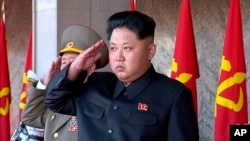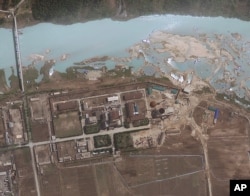Despite North Korea’s recent cooperative behavior, Seoul and Washington show no sign of easing pressure on the Kim Jong Un regime.
Both countries remain concerned over Pyongyang’s nuclear weapons program and are committed to a strong containment policy of economic sanctions and diplomatic isolation to force the regime to give up its nuclear weapons.
Korea analyst Daniel Pinkston, a visiting research fellow at Babes-Bolyai University’s Conflict Studies Center in Romania, said many in the international community view with skepticism North Korea’s recent efforts at engagement, including participating in reunions of separated families and not launching a rocket after indicating it would.
“North Korea’s strategy is to engage and demonstrate cooperation on certain dimensions on a selective basis but without any linkage or performance on denuclearization,” said Pinkston.
Seoul’s National Intelligence Service indicated Tuesday that North Korea is preparing for a fourth nuclear test, although it will not likely happen in the near future.
In Washington Tuesday Sung Kim, the State Department's special representative for North Korea policy, told the Senate Foreign Relations Committee that the Pyongyang government continues to defy the will of the international community.
"The DPRK continues to violate its commitments and international obligations and continues to pursue nuclear weapons and their means of delivery as a strategic national priority all at the cost of the well-being of its own people and while perpetrating horrific abuses against them," said Kim.
North’s nuclear program
Under a 2005 “six party” joint agreement with South Korea, the United States, China, Russia and Japan, North Korea agreed to dismantle its nuclear weapons program in exchange for economic aid, security guarantees and improved diplomatic ties.
But Pyongyang failed to live up to its commitment and conducted nuclear tests in 2006, 2009 and 2013, all of which undermined the deal and resulted in U.N. imposed sanctions on North Korea.
Washington and Seoul have called on Pyongyang to halt its nuclear program as agreed to in 2005 before they will enter into any new international negotiations.
Last year the U.N. recommended referring North Korea to the International Criminal Court for crimes against humanity based on a report documenting a network of political prisons in North Korea and atrocities that included murder, enslavement, torture, rape, and forced abortions. The measure has since been stalled in the Security Council where China and Russia hold veto power.
Recently North Korea indicated it would soon conduct another nuclear test and launch a long-range satellite rocket during its ruling party anniversary in September.
The U.S. and Seoul argued that a rocket launch would be a veiled ballistic missile test and that such provocations would trigger even stronger international sanctions.
Beijing also raised concerns and advised Pyongyang to exercise restraint.
In the end the rocket launch didn’t happen, defusing a possible international crisis. Instead a high level Chinese delegation visited North Korea.
The South Korean spy agency credits in part China’s influence or pressure on North Korea for halting the rocket launch, but also noted that Pyongyang was not technically ready to conduct the missile test.
Given North Korea’s investment and past statements indicating intent to move forward with the rocket program, analysts say it is very likely the test will eventually happen.
China-North Korea Alliance
Relations between China and North Korea had been strained after Pyongyang conducted its third nuclear test in 2013.
But the recent visit of the Chinese delegation seems to indicate improving ties, and Pyongyang’s cooperative behavior of late - including participation in inter-Korean family reunions may reflect Beijing’s moderating influence.
South Korea’s Unification Minister Hong Yong-pyo said Wednesday “North Korea-China relations have recovered faster than expected.”
China supports the denuclearization of the Korean peninsula and the 2013 U.N. sanctions imposed against Pyongyang, but it also provides key economic support to the North to maintain stability on its border and in the region.
Pinkston said Beijing may try to urge Washington and Seoul to lower their thresholds for new talks, but ultimately North Korea will reject any compromise on its nuclear program or any type of internal reforms that would address human rights violations.
“Those changes are so radical. It is not reform. It’s revolutionary change. It is absolutely revolutionary in the context of North Korea,” Pinkston said.
The Kim Jong Un regime also apparently maintains a tight grip on power even though the South Korean National Intelligence Service reports that a large number of North Koreans continue to defect to the South to avoid chronic food shortages and harsh political oppression.
And while the authoritarian state forbids its people from accessing international news, the spy agency says an increasing number of people in the North are believed to be secretly watching or listening to South Korean television and radio broadcasts.
Youmi Kim in Seoul contributed to this report.














